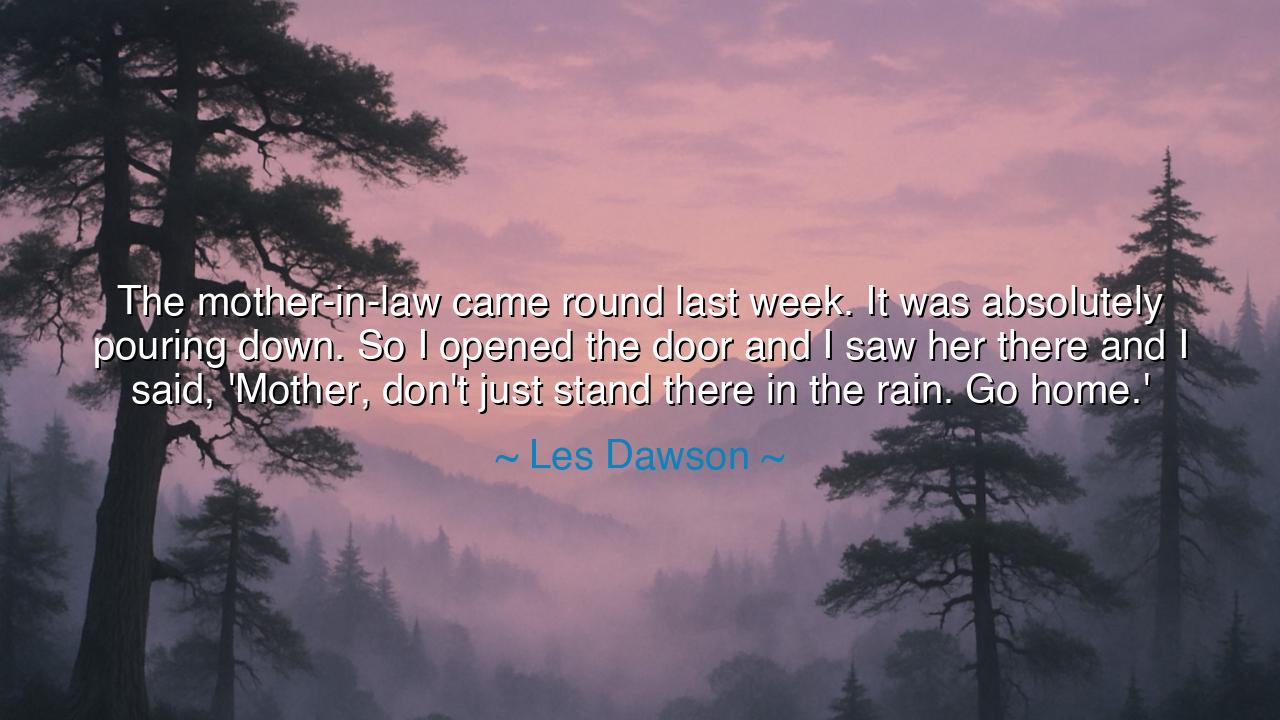
The mother-in-law came round last week. It was absolutely pouring
The mother-in-law came round last week. It was absolutely pouring down. So I opened the door and I saw her there and I said, 'Mother, don't just stand there in the rain. Go home.'






The words of Les Dawson — “The mother-in-law came round last week. It was absolutely pouring down. So I opened the door and I saw her there and I said, ‘Mother, don’t just stand there in the rain. Go home.’” — are wrapped in laughter, yet beneath their humor lies a reflection of timeless human truth. Though spoken in jest, they remind us of the delicate dance between affection and irritation, kinship and distance, love and the small frictions that test it. Dawson, the English comedian of sharp wit and tender melancholy, was a master of using humor to reveal the heart — for every jest carries, like a seed, the shadow of something real.
To understand this quote, we must first recall that Les Dawson lived in an age when the mother-in-law joke had become a cherished tradition of British humor. In the pubs and halls of old England, the mother-in-law was not merely a person — she was an archetype, a symbol of familial tension, of domestic comedy, of that unavoidable closeness which sometimes breeds both warmth and irritation. Dawson’s humor did not emerge from cruelty, but from recognition — the recognition that family life is rarely perfect, yet it is in its imperfections that we find our common humanity.
When he says, “Don’t just stand there in the rain. Go home,” the laughter arises not from malice, but from the absurd exaggeration of human impatience. It is a jest that plays upon the universal experience of strained family bonds — those relationships that test our patience even as they shape our character. Yet the wise listener hears more than laughter in this line. He hears the eternal rhythm of family life — the push and pull of love and irritation, the way affection can wear the mask of mockery. Beneath the joke, Dawson reveals a truth that the ancients knew well: that to love one’s kin is not always to feel sweetness toward them, but to endure and to forgive, again and again, through the humor of daily living.
There is in this jest a mirror of a deeper truth, reflected across ages and cultures. Consider Socrates, who once remarked, “By all means, marry; if you get a good wife, you will become happy; if you get a bad one, you will become a philosopher.” Like Dawson, Socrates cloaked his wisdom in laughter, for humor is the gentlest way to teach resilience. In his jest, as in Dawson’s, lies the lesson that laughter is a shield against bitterness, a way to make peace with the trials that accompany love and family. For who among us has not felt frustration toward those we love most — and who has not found that laughter softens even the hardest moments?
Thus, what appears to be a jest about disdain is in truth a celebration of endurance and perspective. Dawson’s humor, drawn from the heart of working-class life, teaches that to laugh at what irritates us is to rise above it. The rain in his story is no mere weather; it is the symbol of life’s inevitable inconveniences — the downpour of misunderstandings, the drizzle of disappointment. When he bids his mother-in-law to “go home,” he speaks not of cruelty but of survival — the necessary distance that keeps love from drowning beneath the storm of proximity. His laughter is not rejection; it is release.
Yet let the listener beware: to laugh at others is not the same as to despise them. Dawson’s humor worked because it came from affection. He teased his fictional mother-in-law as one teases an old companion — someone whose flaws are known, yet whose presence is woven into one’s life. The ancients would say this jest teaches the virtue of balance — to hold both closeness and independence, to know when to speak and when to be silent, when to joke and when to embrace. For laughter, when used kindly, becomes not a weapon but a bridge — a way to connect across the difficult spaces of the human heart.
So, my children, let this small jest become a great lesson: meet life’s tensions with laughter, not anger. When the rain of annoyance falls upon your soul, do not curse it; smile, and find the humor that sets you free. In every family, in every friendship, there will come moments of friction. Let humor be your balm and patience your shelter. Remember that to laugh together is to love together, even when words fail. For as Les Dawson reminds us in his wry and timeless way, life’s storms will always come — but a heart that can laugh through the rain will never be washed away by it.






AAdministratorAdministrator
Welcome, honored guests. Please leave a comment, we will respond soon